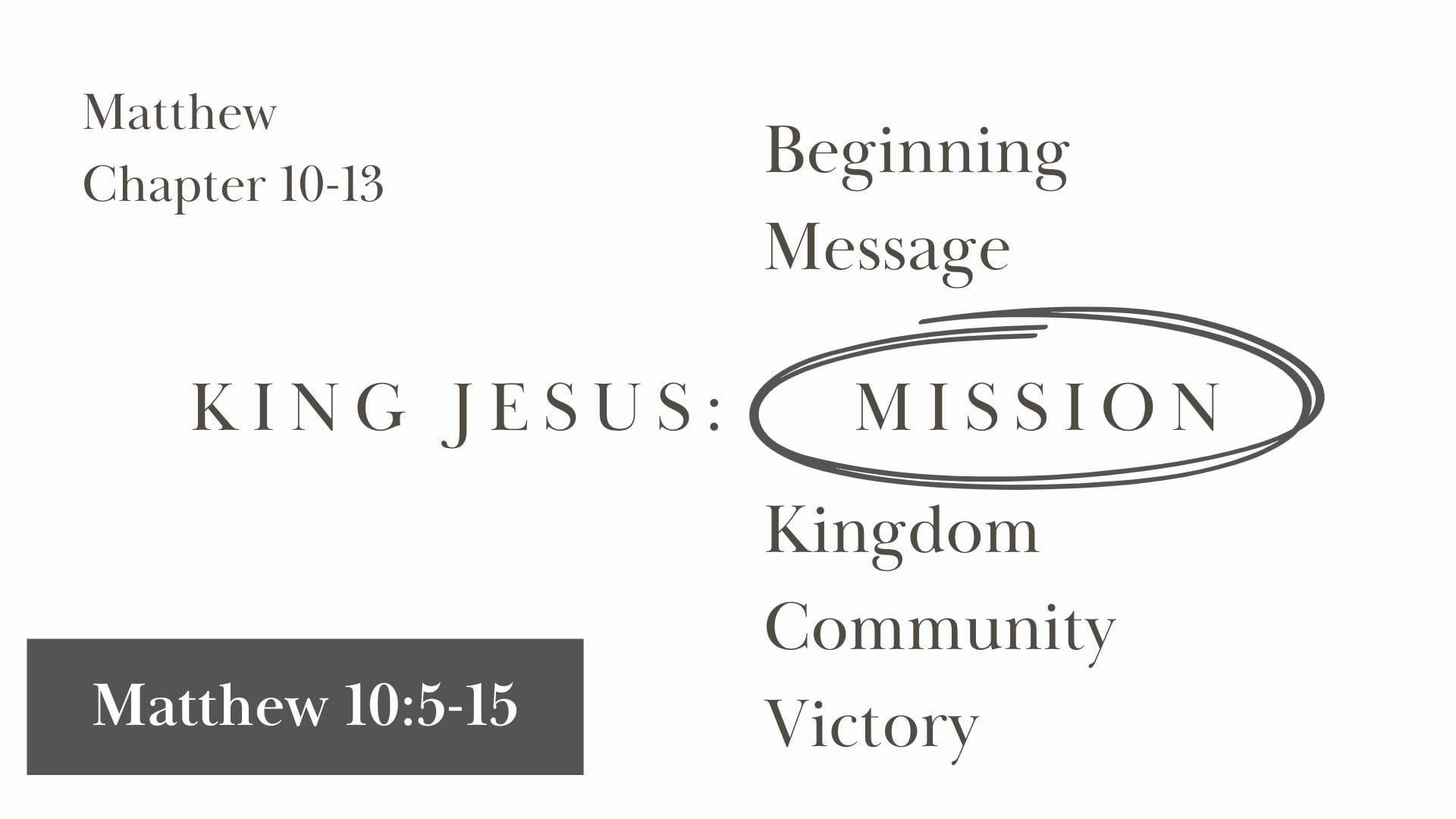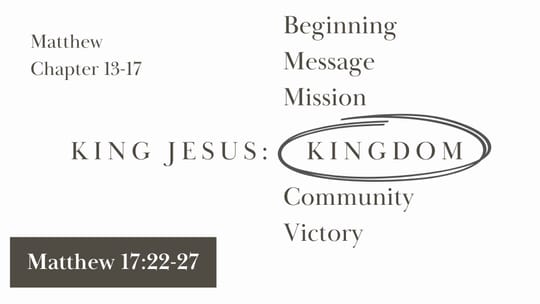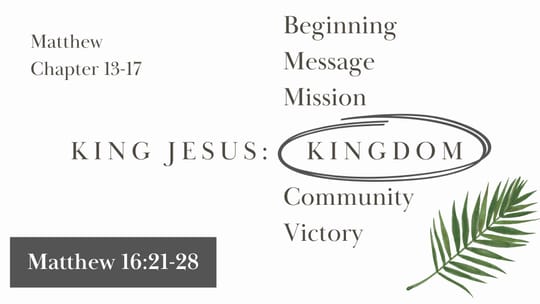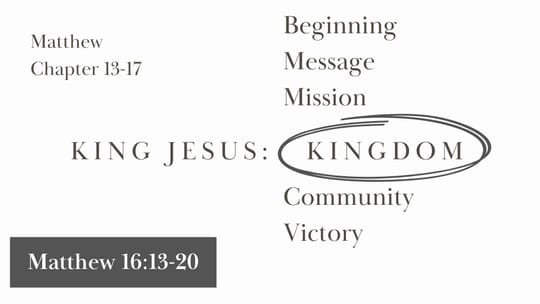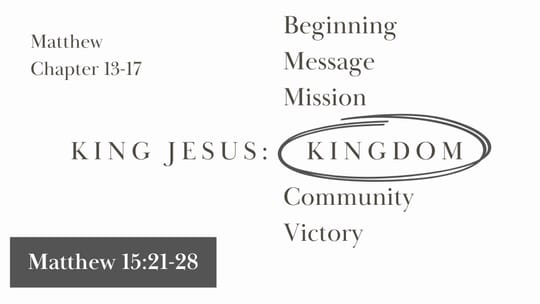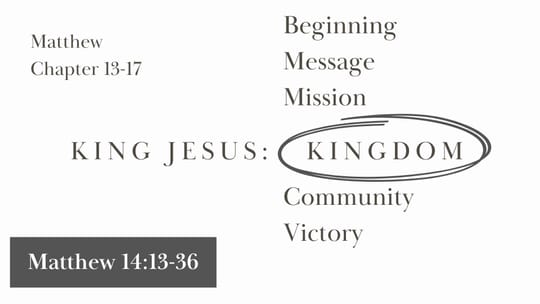Text:
5 Jesus sent out the twelve apostles with these instructions: “Don’t go to the Gentiles or the Samaritans, 6 but only to the people of Israel—God’s lost sheep. 7 Go and announce to them that the Kingdom of Heaven is near. 8 Heal the sick, raise the dead, cure those with leprosy, and cast out demons. Give as freely as you have received!
9 “Don’t take any money in your money belts—no gold, silver, or even copper coins. 10 Don’t carry a traveler’s bag with a change of clothes and sandals or even a walking stick. Don’t hesitate to accept hospitality, because those who work deserve to be fed.
11 “Whenever you enter a city or village, search for a worthy person and stay in his home until you leave town. 12 When you enter the home, give it your blessing. 13 If it turns out to be a worthy home, let your blessing stand; if it is not, take back the blessing. 14 If any household or town refuses to welcome you or listen to your message, shake its dust from your feet as you leave. 15 I tell you the truth, the wicked cities of Sodom and Gomorrah will be better off than such a town on the judgment day.
This is the beginning of our next season through Matthew. This season, we will cover this big idea and build on it each week.
As we follow Jesus, He EMPOWERS us to MAKE A DIFFERENCE.
Overall Commentary: 🌎
Chapter 10 begins what scholars call the "Little Commission." Matthew 28 is known as the Great Commission. Jesus tells His disciples to go into the world and preach the Good News to everyone. This Great Commission will take the rest of their lives and expand till today. Where did they first experience this? How does Jesus know they are ready for such a task? It is because of what we will share over the following few chapters. Jesus didn't just tell them to head out and good luck. Jesus has been teaching and training them for this task. In the following few chapters, Jesus tells them how to do it, where to go, and what to expect along the way.
This is great for us because, while we cannot apply the specifics, such as not going to anyone other than the Jewish nation, we can use the principles for effectively reaching our world with the Gospel.
Last week, we looked at the twelve disciples Jesus chose to be His first "sent out" ones. These normal people show us that Jesus often calls the overlooked, the outcast, and the forgotten to be on His team. Now that He has called them, it is time to start their training. When we look at this passage as principles to apply, we can also see ourselves as able to be a part of His ministry team.
We make a difference as AMBASSADORS IN TRAINING.
Let's break down the first five "how-tos" these ambassadors were given:
Commentary
Verse 5-6: Jesus teaches His ambassadors to see "their world" as their first mission.
- Go only to the Jews- There is a theological and a practical component to this statement by Jesus. Theologically, we must realize the Gospel was always first to the Jew. We can see in the Old Testament God always intended for the Jewish nation to be the ones to bring the Gospel to the rest of the world. God told Abraham that, through his descendants, all the world would be blessed. Therefore, this was not to exclude the rest of the world but to "get his team"ready. This prohibition was lifted when the Great Commission was given. The practical reason is these disciples were experiencing their first foray into "the wild." As a first run, they would have had more success talking with people who had already heard of Jesus, and they had much in common.
- "lost sheep"- Jesus is constantly throwing out the fact the Pharisees and religious elite have not done the job well.
Verse 7-8: Jesus teaches His ambassadors that He empowers us with Hope and Power to do the work.
- The message of hope- notes.
- The power- Jesus is giving them the power to ratify the message they are spreading. These are things the Messiah was said to be able to do. When they tell others that the Messiah has indeed come, it would be apparent people would want proof. These signs would be precisely what they are looking to see.
- Raise the Dead- Scholars have tried to say this was not literal. It is hard to think of anyone other than Jesus having the power to raise people from the dead. However, everything other than this phrase was literal, so we are hard-pressed to come up with any other possibility.
- Apologetic Question: Do we still have this power? Many scholars say this was only given to the original twelve "sent out" ones. This was only given to ratify the message. The major problem with this is the rest of the New Testament. Throughout the rest of the New Testament, the church moves in these gifts to continually spread the Good News.
Verse 9-10: Jesus teaches His ambassadors to place their hope in God and not in others.
- Middle Eastern Hospitality- The problem wasn't whether or not they would find someone to host them. During that time and even now, the common middle eastern culture is known for its radical hospitality. This is why Jesus says to find someone worthy. Worthy doesn't mean they rate the value of someone. Jesus is talking about someone who agrees with their message.
- Clarity from the Parallels of Other Gospels- From the other Gospels, we are able to hear the rest of what Jesus meant. He was not saying they were supposed to go naked and shoeless. He is saying they should only take what they need. This is both theological and practical. Theologically, they need to learn to depend on God to open the right doors. Practically, they would not be gone long, so they did not need to pack for a long trip. We also see from the other Gospels this was not the only time Jesus did this. Later He would send out over 70.
- Travel bag- This was also known as a "beggers bag." Travelers would carry these bags and beg for money along the way. Jesus told them not to beg but to trust in God's provision.
- Walking stick- Many travelers would carry a staff as a form of protection. Jesus is telling them to trust in God's protection along the way.
Verse 11-15: Jesus teaches His ambassadors that we have the greatest gift to offer; His peace.
- Shalom- When we say the word "peace" in English, it has a basic meaning of calmness. In Hebrew, peace is the word "shalom." Shalom is much more than a simple word of calmness. It is a state of being. It is completeness and wholeness. It sounds a lot like the fruit of the Spirit in Galatians 5. Jesus is saying He allowed them to offer wholeness to the people they come in contact with. This is a great blessing we still can offer people today.
What can we learn from this passage?
Several years after the Great Commission had begun and the early church had started, the Apostle Paul said this about our role in the Kingdom of God:
(2 Corinthians 5:20) So we are Christ’s ambassadors; God is making his appeal through us. We speak for Christ when we plead, “Come back to God!”
A very basic definition of an ambassador is the highest-ranking diplomat SENT from one country to another. We can move through our world with confident hope because we are never without a purpose. God has given us all constant meaning and focus. We have been called into every environment we find ourselves in. We must be careful to realize God has not sent us into a world that is already in love with Him. They are lost, alone, and in the dark. Therefore, we should not expect them to act like Christians. We should realize the world is not our enemy. The one who has blinded them is. They are our mission.
Questions/Journal Prompts for reflection:
- Have you ever thought about who our first “mission” is toward?
- How can you bring the hope of Jesus this week to someone?
- Why do you think it is so hard to share your hope with others?
- Do you sometimes see the world as hopeless? Why?
Resources For Further Study
- Blue Letter Bible: Cross-Reference/Word Studies/Translations
- How to Cross-reference passages. Let the Bible interpret the Bible.
- BibleHub.com: So. Many. Tools.
- Sending Out the Twelve from Enduring Word
- Bible Study Notes: The First Mission
- Matthew Henry Commentary
- Instruction the Twelve From One Hope Fellowship
- Principles of Ministry
